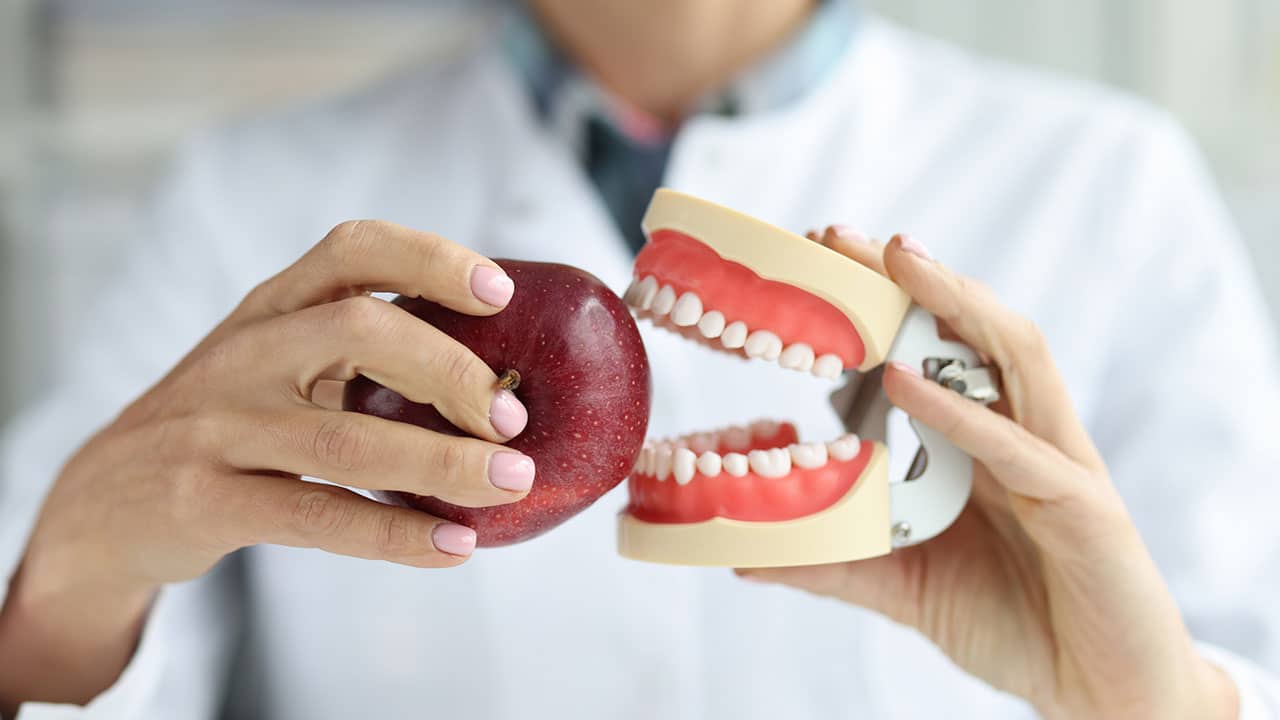
Many people begin to notice changes in their eating habits after receiving dentures, and this shift often becomes more obvious when familiar meals suddenly feel harder to manage or when long-trusted flavors seem different in ways they cannot fully explain.
How do dentures influence daily food choices?
Dentures influence food choices by changing how people bite and chew. According to our editor’s research, many individuals need time to adapt. The mouth adjusts slowly to the new structure placed inside it. Soft foods become easier to tolerate during the early adaptation period. People often limit harder textures because chewing requires more control. This adjustment period may continue for several weeks depending on comfort. Some people feel pressure points that affect meal preferences temporarily. Dentists frequently explain that this transition is normal and expected. They emphasize patience while new eating patterns slowly take shape. Changes in texture preferences often lead people to modify cooking habits. Many choose steamed vegetables instead of raw options to ease chewing. Fruits may be cut smaller to reduce pressure on sensitive areas. Breads or crackers may feel difficult until the mouth becomes stronger. As a result of our editor’s reviews, softer choices dominate early diets. This pattern may reduce overall nutrient intake if not monitored carefully. Dentists advise simple adjustments to maintain balanced meals during adaptation. These gradual shifts help people maintain comfort without weakening nutrition.
Why does chewing become more challenging with dentures?
Chewing becomes more challenging with dentures because natural teeth provide strong anchoring. Dentures sit on gum tissue and rely on suction or attachments for stability. This design changes how force spreads across the mouth. Chewing movements feel different and require new muscle coordination. People may instinctively avoid certain foods during early adaptation. This reaction reflects the body’s response to unfamiliar mechanical patterns. As a result of our editor’s reviews, chewing challenges improve steadily with practice. Many regain confidence after understanding how to position food properly. Dentures also reduce direct sensory feedback from the teeth. Natural teeth detect pressure more efficiently through their roots. Dentures lack this connection so chewing feels less precise initially. This can cause hesitations when biting firmer textures like apples. Some individuals unconsciously shift food to easier positions in the mouth. Dentists explain that repetitive practice strengthens control over denture movement. Chewing slower helps prevent shifting and improves meal enjoyment. This habit gradually restores confidence and reduces nutritional compromise.
What nutrient deficiencies may occur with poor denture adaptation?
Poor denture adaptation may contribute to reduced protein intake. People sometimes avoid meat because it requires strong chewing force. Protein plays an important role in maintaining muscle health. Low intake over time may influence energy levels and recovery. Vegetable consumption may also decline if raw options feel uncomfortable. This can reduce fiber, vitamin C, and essential antioxidants. According to our editor’s research, such changes appear slowly but steadily. Early dietary adjustments help prevent these long-term deficiencies. Hard fruits and nuts also become challenging for new denture users. These foods provide critical minerals and healthy fats. When removed from the diet, nutrient balance may shift. Calcium intake may decrease if dairy options feel difficult to manage. This raises concerns for bone and gum support in the long run. As a result of our editor’s reviews, dietitians recommend alternative textures. Soft yogurt, tender meats, and blended soups support balanced intake. These small changes strengthen nutrition without reducing meal satisfaction.
How can people maintain adequate nutrition while using dentures?
People maintain adequate nutrition by choosing softer versions of nutrient-dense foods. Tender meats like slow-cooked poultry offer high protein. Steamed vegetables retain vitamins while easing chewing pressure. Mashed or blended fruits maintain flavor and nutritional value. Cooked grains soften easily and provide steady energy. According to our editor’s research, consistent meal planning improves intake. Balanced meals help people adjust comfortably without nutritional gaps. Dentists often encourage slow eating to enhance chewing efficiency. Hydration also supports proper nutrition with dentures. Adequate water helps maintain saliva flow essential for digestion. Dry mouth may increase when dentures cover large gum surfaces. This dryness can reduce appetite or change how food tastes. Staying hydrated improves comfort during chewing and swallowing. As a result of our editor’s reviews, hydration remains a key recommendation. Simple habits like drinking water between bites make meals smoother. These small steps support both nutrition and denture comfort.
What foods become easier to manage with proper denture technique?
Foods like cooked vegetables become easier with proper denture technique. Soft textures distribute pressure evenly across the dentures. Stews and soups allow comfortable consumption of varied ingredients. Casseroles combine protein, vegetables, and grains in manageable form. Egg dishes like omelets offer gentle textures packed with nutrients. According to our editor’s research, these meals reduce chewing strain. Many patients appreciate how adaptable these meals can be daily. Simple cooking changes significantly improve eating confidence. Fruits also become easier when cut into small pieces. Bananas and melons naturally provide soft textures. Canned peaches offer a smooth experience for sensitive gums. Yogurt with fruit enhances nutritional density and digestion. Nut butters provide healthy fats without chewing challenges. As a result of our editor’s reviews, these options remain popular. They support balanced nutrient intake without discomfort. People often reintroduce firmer textures after confidence returns.
How do ill-fitting dentures affect eating habits?
Ill-fitting dentures slide during chewing and cause discomfort. Movement disrupts efficient chewing and limits food choices. People may avoid tough or sticky items due to shifting. This gradually narrows the variety of foods they eat. Gum irritation increases when dentures rub against soft tissue. According to our editor’s research, soreness reduces appetite noticeably. People often describe fatigue after meals due to constant adjustment. These experiences affect both nutrition and overall well-being. Pain also increases sensitivity to temperature and texture. Hot foods may feel sharper against swollen areas. Crunchy items create pressure points that worsen irritation. Over time, people develop habits that avoid discomfort. These habits frequently reduce essential nutrient intake unintentionally. As a result of our editor’s reviews, dental follow-up becomes essential. Adjustments restore proper fit and reduce chewing difficulty. Regular checkups maintain comfort and nutritional stability.
Why do dentures change taste perception for some people?
Dentures change taste perception when they cover portions of the palate. Taste receptors along the mouth detect flavors differently with coverage. The acrylic surface blocks airflow that enhances taste sensations. People may describe certain foods as muted or less appealing. According to our editor’s research, this sensation varies widely. Some individuals adapt quickly while others need more time. Warm foods sometimes taste stronger due to temperature effect. Experimenting with spices helps restore enjoyable flavor. Saliva changes also influence taste with dentures. Dry mouth decreases flavor detection throughout a meal. Saliva helps dissolve food particles for better taste perception. Dentures may reduce natural saliva flow in some individuals. Hydration improves taste sensitivity and supports comfortable chewing. As a result of our editor’s reviews, sipping water helps greatly. Moist foods often taste richer and easier to enjoy. These adjustments restore confidence in meal enjoyment.
How can individuals regain confidence eating with dentures?
Individuals regain confidence by practicing controlled chewing daily. Starting with soft foods strengthens jaw coordination gradually. Small bites reduce the chance of denture shifting. Chewing on both sides maintains symmetrical pressure distribution. According to our editor’s research, consistent practice builds stability. People often feel improvement within weeks of regular effort. Relaxed eating habits enhance both comfort and nutrition. This improvement encourages reintroduction of varied textures. Sharing concerns with a dentist also improves confidence. Professional adjustments eliminate sore spots and discomfort. Guidance from dental experts helps refine chewing techniques. Supportive advice reduces anxiety about meal challenges. As a result of our editor’s reviews, reassurance improves outcomes. People appreciate knowing their concerns are common and solvable. Confidence grows when eating becomes predictable and comfortable. This progress strengthens overall well-being.
What role do dentists play in supporting nutritional health?
Dentists support nutritional health by guiding meal adjustments. They recommend soft foods during early denture adaptation. They monitor gum health to ensure safe chewing. They adjust denture fit to reduce pressure points. According to our editor’s research, dental guidance improves outcomes. Dentists help identify foods that offer comfortable nutrition. They encourage gradual return to regular eating patterns. Regular visits help maintain both comfort and stability. Dentists also collaborate with dietitians when necessary. Combined guidance ensures nutrient balance during adaptation. This teamwork helps prevent unintended nutritional deficiencies. They encourage small daily goals for healthier intake. As a result of our editor’s reviews, collaboration improves patient satisfaction. People feel supported from multiple angles of care. Clear instructions simplify daily eating decisions effectively. This approach keeps meals enjoyable and nutritious.
Why is maintaining nutrition important for denture users?
Nutrition supports overall health and mouth comfort. Balanced meals strengthen gum tissues supporting denture stability. Vitamin-rich foods help maintain oral resilience. Protein supports muscle function involved in chewing. According to our editor’s research, poor nutrition worsens discomfort. Low energy reduces motivation to adapt to dentures. Healthy habits improve both comfort and daily function. Good nutrition enhances confidence during meals. Strong immunity also depends on proper nutrition. Nutrient deficiencies weaken the body’s natural defenses. Illness or weakness disrupts denture adaptation further. Maintaining balanced meals keeps energy levels stable. As a result of our editor’s reviews, consistency matters greatly. Simple meals with soft textures ensure reliable nourishment. These habits support better long-term denture success. Proper nutrition strengthens both health and comfort.
Key insights about dentures and nutrition
Dentures influence daily eating habits through changes in chewing, taste, and comfort. According to our editor’s research, early adaptation challenges often shift food preferences. Balanced meals remain achievable with small adjustments to texture and preparation. People benefit from consistent practice, hydration, and dental support. These simple habits help maintain nutrition without unnecessary restrictions. Healthy eating strengthens both denture comfort and overall well-being. Understanding the connection empowers better daily choices. Small routines create meaningful improvements in confidence and nutrition.
